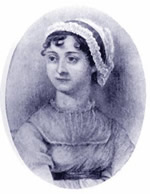Jane Austen was born in the village of Steventon, Hampshire in 1775, into the large lively family of a rector. As a child from 1787 to 1793, she wrote plays, verses, short novels and prose work often in parody of popular genres. Her first complete mature work Lady Susan (1871) was a short epistolary novel (written in the form of an exchange of letters) but all her early novels were initially unpublished. The family lived in Bath for a number of years until her father died in 1805. Later they moved to a cottage on her brother Edward’s estate in Chawton and Austen approached her writing with renewed earnest. Sense and Sensibility was published anonymously in 1811 and was greeted with good reviews. Pride and Prejudice (1813), Mansfield Park (1814) Emma (1815) followed and she became an established, though anonymous, author. She continued writing despite deteriorating health (now diagnosed as Addison’s Disease) and died in 1817. Persuasion and Northanger Abbey were published later that year. Beside her novels, Austen left a legacy of correspondence with her sister Cassandra and several unfinished works.  The characters, settings and subject matter of Austen’s novels are drawn from her own background amongst the minor landed gentry and the clergy and the middle-class society of the village and country town with occasional visits to London and Bath.
The characters, settings and subject matter of Austen’s novels are drawn from her own background amongst the minor landed gentry and the clergy and the middle-class society of the village and country town with occasional visits to London and Bath.
Her three earliest novels (including Pride and Prejudice) are comic depictions of character and society, employing a quantity of sharp literary satire. Sense and Sensibility is about two sisters, one the epitome of romantic ‘sensibility’ falls in love with an unscrupulous fortune hunter whilst the other sister is guided by ‘sense’ or prudence. Northanger Abbey satirises the distortions of Gothic tales causing the heroine to read her surroundings in a rather sinister light. Austen’s mature novels concentrate more on comedies of the individual character and society. In Mansfield Park Fanny Price’s moral strength sees her through difficult times while Emma (her most consistently comic novel) is the tale of an enthusiastic but naive matchmaker attempting to meddle in the lives of her friends. Finally Persuasion, Austen’s final complete work tells of a renewed affection between a couple, years after being parted by her family’s snobbery.
While popular, Austen never received full literary recognition during her lifetime but in writing about women and their path to psychological maturity and love, relating their experiences to society as a whole, her work formed the basis of the modern novel with its focus on ordinary people in everyday life, rather than in exaggerated adventures or escapades. She created the middle-class comedy of manners and explored the possibilities of ‘domestic’ literature. Despite the apparent ordinariness of the events, her elegantly constructed compositions are written with remarkable wit and skill.